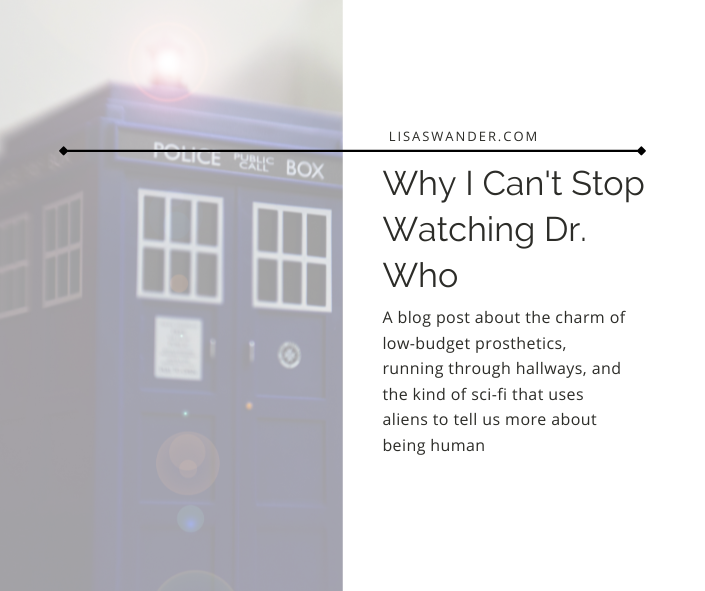I don’t know why it took me so long to start watching Dr. Who.
Well, yes I do. Even on the nerdy, fan-frothing message boards I was hanging out on in the early 2000s, being a Dr. Who person was regarded as extreme. A fandom outlier. A brand of weirdness separate from us X-Philes and Smallvillians, who had at least the decency to source our obsessions from American network television.
Or so my Mulder and Scully action figures whispered to me in the dark.
Regardless, here I am, two seasons into David Tennant’s Dr. Who run, and I tell you I cannot stop watching.
Someday soon—very soon, at the rate I’m binging episodes—I shall become buried in the fandom. I can sense this, like a low-budget CGI ship cresting the London skyline. Soon I will be unable to see through the frosted glass of internet opinion and thus unable to articulate what makes Dr. Who such a magical slice of the BBC pie.
But that day is not today.
Today I can tell you that watching Dr. Who, especially for the first time, is nothing short of life-affirming. For two smallish reasons and one big whopping one.
The first minor reason is the overall aesthetic of Dr. Who, which I would describe as “laser tag chic.” The props look like they’ve been sourced from a back room at Howie’s Year-Round Halloween Barn. Every episode takes place in the same hallway, warehouse, or stairwell, but fitted with fresh strobe lights or bursts of steam to match the planet du jour.
Actors are employed in a similar fashion. Anyone who isn’t David Tennant or Catherine Tate can appear and reappear in as many roles as the writers fancy, without any acknowledgement that they were somebody else a week ago. Because if the Queen wouldn’t say anything, neither should we.
All of this is endearing. It’s offered with such conviction—including David Tennant’s unflinching commitment to being electrocuted, disincorporated, or rapid-aged into convulsions at least once a week—that you just want to give that rubber-masked octopus guy a big warm hug whenever you see him.
Which feeds into the second undersized appeal of Dr. Who: a general sense of mania. For the most part, this comes from breakneck, exposition-free scripts. Everyone in Britain has been watching Dr. Who since birth, and so the show gets to drop its viewers straight into the action without apology, context, or any explanation whatsoever about the short helmeted aliens the soundtrack seems to know already. The TARDIS just arrives on some planet somewhere and off we go.
Clearly the Queen wouldn’t say anything about this, either.
The rest of Dr. Who‘s manic tone comes from the physicality of The Doctor himself. Between 60 and 70 percent of each episode will be David Tennant careening his very tall, very skinny self through hallways like a Muppet fleeing Manhattan. The remaining percent will be someone wearing a trash can screaming about taking over the universe.
All of this is delightful.
But it’s still not the big whopping reason Dr. Who makes you feel alive. No, that’s because beneath all the frenzied silliness and weebly-wobbly-timey-wimey stuff, Dr. Who is a show about—SURPRISE!!—what it means to be human.
Like all heavy metaphors for humanity, this one is best embodied by an alien, The Doctor. After his home planet was destroyed, he set off to explore the universe, regenerating into a new body whenever necessary. He’s lasted that way for 900 years.
It won’t surprise you to know the whole regeneration thing was the product of needing to switch actors in the 1960s. But the writers have wisely chosen to expand that beyond a convenient retcon into the core of what The Doctor is.
He’s lonely.
The Doctor is the only one left of his species. He will outlive everyone he has ever loved. Over and over again, with each new companion (Who-speak for the humans who travel with The Doctor), he has to ask himself if it’s worth it. Is it worth it to love someone, or a series of someones, knowing absolutely for certain that they will leave? Is a short period of connection worth untold months or years or lifetimes of grief?
This is the story I can’t stop watching. The Doctor is lonely and The Doctor is us. Yes, we can travel with others for parts of the journey, but separation is our default state. For The Doctor, that’s because of his lifespan. For us, that’s because at some point before time began, our indwelling consciousness decided to split itself into 7 billion different parts. And inhabit 7 billion different bodies.
That’s great for the experience of consciousness, I guess, but what about us, the parts? All we get is a fundamental yearning for other bits of creation. A subconscious, unyielding certainty that we’re not meant to be alone.
The Doctor could just travel by himself, after all. He has infinite time—why not see every cool thing in the universe alone? Why not let his heart(s) live in a neutral state of non-attachment and circumvent all this soul-crushing grief?
Well, because there’s a limit to how much cool stuff you can bear to see without having someone to share it with.
The Doctor is a metaphor for the human condition, but he’s also a metaphor for consciousness itself. If the point of all existence is, as Alan Watts puts it, for the universe to be “playing the game of hide-and-seek with itself,” we’re all forever seeking. The light of God is the light in us, and it’s a puzzle always hoping to be put back together—through friendship, through love, through a sympathetic look between parents of screaming toddlers.
That’s why we always choose not to travel alone. Even when we know it will end in heartbreak. Or death. Or kids moving out. Or friends drifting away. We survive these things, somehow, and then we say we’ll never do them again. Then we always do.
Which brings us to the matter of surviving: The Doctor’s regeneration.
The idea that our lives are a series of evolving incarnations should be familiar to anyone who’s lived past childhood. The idea that those incarnations might become unrecognizable to us, especially as we age, should be familiar to anyone who’s working on the second half of life.
The Doctor almost always regenerates in response to a mortal wound. It’s change or die. It’s the monomyth.
If you’ve ever survived something you thought would kill you (if you’re a human, in other words), you see us in The Doctor here, too. You know you’ll resist the transformation. You know it will look like an impending death, although hopefully without the laser beams shooting out of your eye sockets.
And you know it will be more like a rebirth.
I haven’t watched The Tenth Doctor regenerate yet, but I already know I’ll witness it the same way I have witnessed all of my own regenerations: with resistance, with grief, and with sorrow that breaks into reckless hope.
And then I’ll probably start watching Broadchurch because, you know, DT. But that will be in ADDITION to the next season of Dr. Who because I’m sure Matt Smith is also great and I’m not lost to the internet comment section just yet. Don’t worry, there’s room in my heart for both of them. That’s because my heart, like all human hearts, is built like the TARDIS: bigger on the inside.
I recommend that you watch Dr. Who, my friends. Come for the recycle bin prosthetics; stay for the reminder we’re all just lonely travelers. Hug your companions.
And maybe that octopus guy, too.



I don’t watch much TV, so this is a really big deal: you’ve convinced me to watch Doctor Who. Time travel, kitsch, angst, and DT. How could I resist?!
Oh my friend you are NOT going to regret this decision.